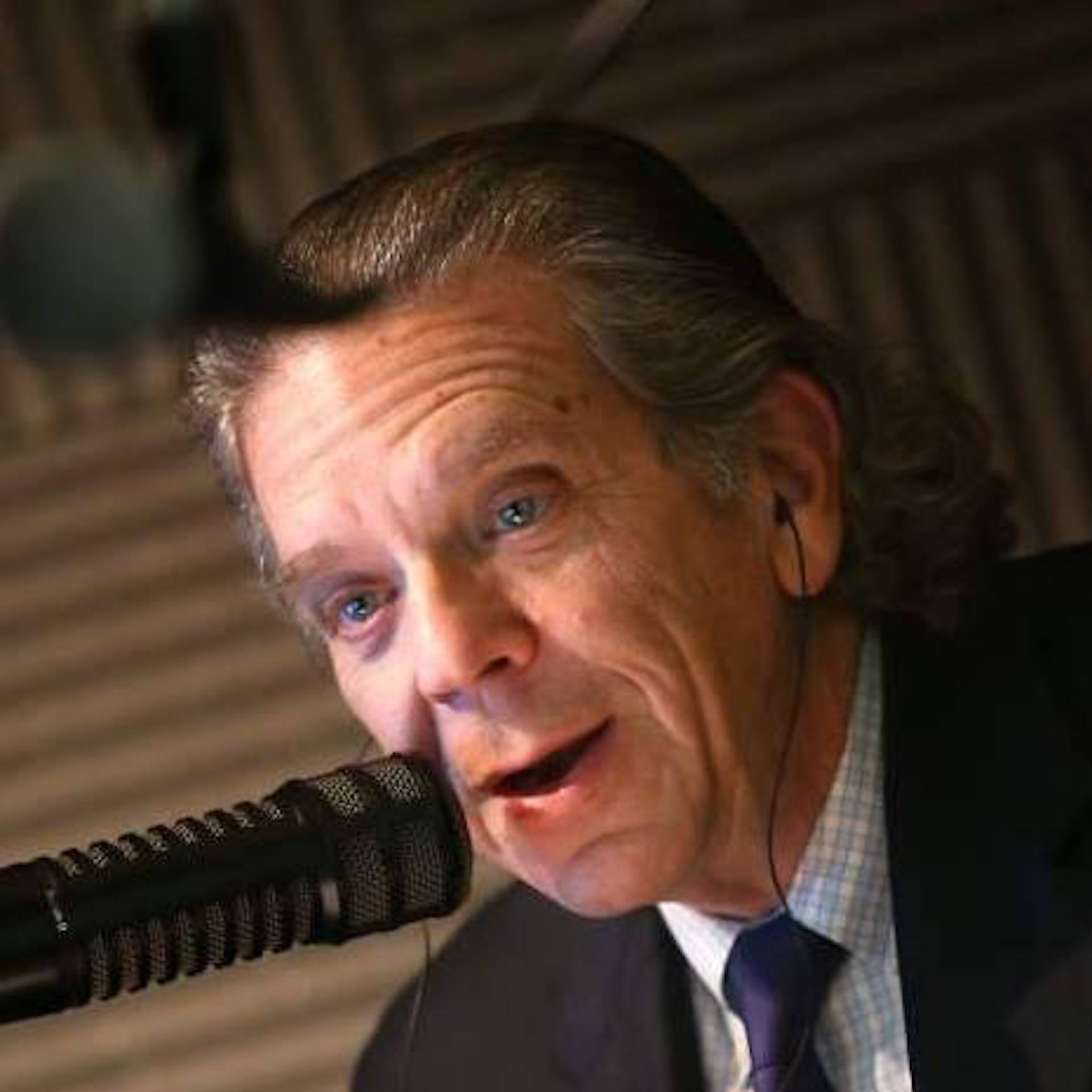Episodes
Thursday Apr 16, 2020
Our Evolution Is A Graveyard of Ancient Viruses.
Thursday Apr 16, 2020
Thursday Apr 16, 2020
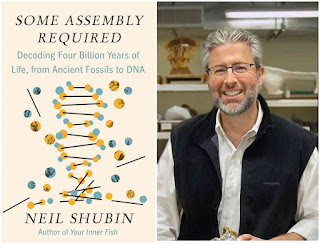 Perhaps at no single moment in modern time have we been more self-aware about the human body and human anatomy. I suspect that all of you have a new understanding of how viruses work, how RNA duplicates, how generic material plays a role in the evolution of disease.
Perhaps at no single moment in modern time have we been more self-aware about the human body and human anatomy. I suspect that all of you have a new understanding of how viruses work, how RNA duplicates, how generic material plays a role in the evolution of disease.
Therefore it becomes the perfect time to zoom out from that personal insight to look at the broad evolutionary perspective of how we got here to this time and palace. How did our vulnerable lungs and respiratory systems evolve and what does that evolution tell us about life now, our collective future and our own evolution prospects? And most of all in this age of cutting edge biological and genetic science, what control do we have over any of it?
Neil Shubin is the Robert R. Bensley Professor of Organismal Biology and Anatomy at the University of Chicago. provost of the Field Museum of Natural History and his latest work is Some Assembly Required: Decoding Four Billion Years of Life, from Ancient Fossils to DNA
My conversation with Neil Shubin:
Tuesday Apr 07, 2020
When We Come Back, Every Business Could Be A Startup: Here Are Some Rules
Tuesday Apr 07, 2020
Tuesday Apr 07, 2020
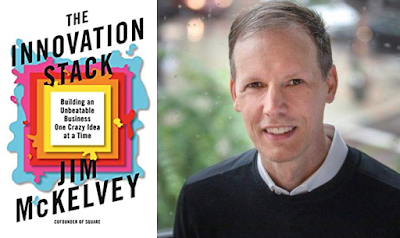 When we do come back from the current crisis, in some ways every business will be a startup. Sadly, some business will not make it through. Others will struggle to come back. And in some cases innovation will prevail. That is, new problems will result in new business opportunities. Disruption, innovation, and the desire and the will to succeed will drive entrepreneurs to imagine whole new companies and whole new ways of relaunching old ones. And some will be wildly successful and maybe even become household words.
When we do come back from the current crisis, in some ways every business will be a startup. Sadly, some business will not make it through. Others will struggle to come back. And in some cases innovation will prevail. That is, new problems will result in new business opportunities. Disruption, innovation, and the desire and the will to succeed will drive entrepreneurs to imagine whole new companies and whole new ways of relaunching old ones. And some will be wildly successful and maybe even become household words.
It makes you wonder, is there a formula for start up success. Are there rules or at least a framework? There is what Jim McKelvey calls The Innovation Stack.
My conversation with Jim McKelvey:
Friday Mar 27, 2020
A Look At What Real Leadership Skills Might Look Like
Friday Mar 27, 2020
Friday Mar 27, 2020
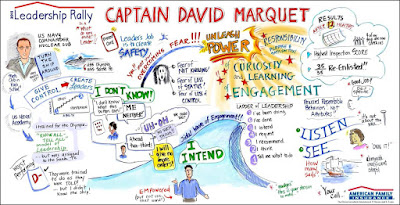 If you go into any bookstore and go to the section with business books, you will find enough books on leadership to fill its own library.
If you go into any bookstore and go to the section with business books, you will find enough books on leadership to fill its own library.
The problem with most of them is that they focus on how to get followers to follow the orders of the leader. To enact in real life, the old kids game of follow-the-leader.
It’s often about trying to get inside the head of followers to understand what makes them tick and how to motivate them. But suppose, the real power of the leader was not to try and motivate followers but to be clear enough about articulating his or her own intent in such a way that it becomes almost axiomatic for others to understand and want to follow. Suppose motivation came from within the leader, not from external forces or orders.
That’s at the heart of the approach to leadership put forth by retired US Navy Captain David Marquet in his new work Leadership Is Language: The Hidden Power of What You Say--and What You Don't.
My conversation with David Marquet:
Saturday Mar 21, 2020
Can Journalism Be Saved: A Conversation with Nicholas Lemann
Saturday Mar 21, 2020
Saturday Mar 21, 2020
 One of the seemingly consistent things about creative destruction, particularly as a result of technology, is that we have a short memory for what came before the change. We remember just immediately preceding a dramatic shift in some vital element of our lives, but we forget what came before. It has the patina of making us nostalgic for the remembered past, even though we forget the long history.
One of the seemingly consistent things about creative destruction, particularly as a result of technology, is that we have a short memory for what came before the change. We remember just immediately preceding a dramatic shift in some vital element of our lives, but we forget what came before. It has the patina of making us nostalgic for the remembered past, even though we forget the long history.
This certainly seems to be true of journalism. We look at the landscape of what venture capitalist Jason Calacanis calls “late-stage journalism” and we see a world that is certainly far from what folks once though was the Golden Age of journalism in the 60s, 70s, and 80 and ’90s. But as a part of broader history, the picture is different. And perhaps it is only in seeing that difference, that we can adapt to the economic, political and socials needs of journalism today.
To talk about this, I'm joined by the journalist and Dean Emeritus of the Columbia University Graduate School of Journalism, Nicholas Lemann. His story, Can Journalism be Saved, appears in the most recent issue of the The New York Review of Books.
My conversation with Nicholas Lemann:
Wednesday Mar 18, 2020
David Plouffe on Beating Donald Trump
Wednesday Mar 18, 2020
Wednesday Mar 18, 2020
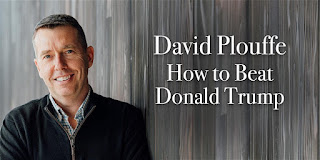 Even if you are not a political junkie, even if you only pay attention occasionally, the one thing you should have learned is that campaigns matters. And while this is true at the most local level, it is true in bold relief in our national presidential campaigns.
Even if you are not a political junkie, even if you only pay attention occasionally, the one thing you should have learned is that campaigns matters. And while this is true at the most local level, it is true in bold relief in our national presidential campaigns.
It seems that in the modern political era, presidential cycles each layer on new accessories to the campaign process.
In 1960 it was the televised debate. In l964 it was an insurgent winning primaries and the nomination. In 1968, it was the beginning of the politics of division and the Southern Strategy. In 1976, we saw the full flowering of the power of primaries and people over back rooms. In 1980 we saw the consolidation of personality over politics. In 1992 the coming together of personality and the emerge of modern campaign techniques. And in 2008 the first full emergence of GOTV efforts, digital media, more sophisticated polling combined with old school grassroots politics.
It didn’t hurt that in Barak Obama there was also a great candidate with finely tuned political instincts and a brilliant campaign lead by a man steeped in the history of campaigns. That was David Plouffe. He continues his political wisdom in his new work A Citizen's Guide to Beating Donald Trump.
My conversation with David Plouffe:
Monday Mar 09, 2020
Monday Mar 09, 2020
 Usually attributed to Balzac is the observation that behind every great fortune is a great crime. In this day and age, It might be paraphrased as that behind every great financial crime is a great bank.
Usually attributed to Balzac is the observation that behind every great fortune is a great crime. In this day and age, It might be paraphrased as that behind every great financial crime is a great bank.
In the case of many such crimes in the 20th and 21st century lies Deutsche Bank. In its efforts to
grow it did away with all traditional ideas of risk management. In its pursuit of fees and earnings, bank executives got into business with some of the world’s most shady and financially needy characters. Russian oligarchs, the Trumps, the Kushners, the Mercers, Vladimir Putin, and many other key Russiagate figures were among their customers.
It got involved with other banks in Germany, Moscow, Cyprus, and Moldavia; money laundering; real estate deals; hedge funds; indictments; bankruptcies; and a cast of characters orbiting it that feels more like the bar scene in the original Star Wars.
Trying to tie all of this together into one overarching narrative is David Enrich in his book Dark Towers: Deutsche Bank, Donald Trump, and an Epic Trail of Destruction
My conversation with David Enrich:
Tuesday Mar 03, 2020
When Will The Boomers Leave the Stage?
Tuesday Mar 03, 2020
Tuesday Mar 03, 2020
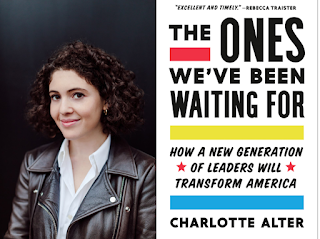 We are living through what is perhaps the last hurrah of boomer leaders. It’s hard to believe that it was only 28 years ago that we elected, in Bill Clinton, the first of only three boomer presidents, after having eight presidents, from Ike to George H.W. Bush, who represented the Greatest Generation.
We are living through what is perhaps the last hurrah of boomer leaders. It’s hard to believe that it was only 28 years ago that we elected, in Bill Clinton, the first of only three boomer presidents, after having eight presidents, from Ike to George H.W. Bush, who represented the Greatest Generation.
Today we have a cadre of boomers, all septuagenarians, trying to make one last attempt in a world moving and changing faster than ever, trying to keep alive the aging boomer legacy.
As they do, a whole new generation is waiting in the wings. Soon, in the words of JFK, the torch will be passed to a new generation of Americans. Millennials shaped not by JFK, as so many boomers were, by their memories of 9/11, endless war and the financial crisis.
Capturing the political zeitgeist of these millennials at this moment is Charlotte Alter, in her new book The Ones We've Been Waiting For: How a New Generation of Leaders Will Transform America
My conversation with Charlotte Alter:
Wednesday Feb 26, 2020
Hong Kong on the Brink
Wednesday Feb 26, 2020
Wednesday Feb 26, 2020
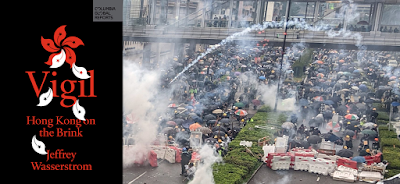 Trade Wars, intellectual property, public health, the global economy and democracy vs. authoritarianism. All are major parts of our public dialogues and all pertain to the state of China today. No other nation on the planet presents such an enormous footprint of the future. Perhaps even more so than the US.
Trade Wars, intellectual property, public health, the global economy and democracy vs. authoritarianism. All are major parts of our public dialogues and all pertain to the state of China today. No other nation on the planet presents such an enormous footprint of the future. Perhaps even more so than the US.
That’s why the protests and events of the past year or so in Hong Kong are so important. Not just to the people of Hong Kong, but as a symbol of the face that China decides it’s comfortable putting forth to the world.
Jeffrey Wasserstrom, Chancellor’s Professor of History at UC Irvine brings this into the focus in his new book Vigil: Hong Kong on the Brink.
My conversation with Jeffrey Wasserstrom
Monday Feb 24, 2020
You Say You Want A Revolution
Monday Feb 24, 2020
Monday Feb 24, 2020
 We look at our political and cultural divide today and think that it can’t get much worse. What we forget is that it has been worse. Not just when policy matters were settled by a duel or literally pitted brother against brother, but even in the 1960s and 1970s when students where shot at Kent State. Law enforcement was murdered in politically motivated robberies, and even the bombing of the US Capitol was part of our contemporary political history and division.
We look at our political and cultural divide today and think that it can’t get much worse. What we forget is that it has been worse. Not just when policy matters were settled by a duel or literally pitted brother against brother, but even in the 1960s and 1970s when students where shot at Kent State. Law enforcement was murdered in politically motivated robberies, and even the bombing of the US Capitol was part of our contemporary political history and division.
A powerful example of this period is a group of left wing women fresh from their time in the Weather Underground. They got together in the early 1980s in the first blush of the Reagan years to become essentially domestic terrorists bent on opposing the political, corporate, and government ideologies of the time.
William Rosenau, takes us back to that time in his recent book Tonight We Bombed the U.S. Capitol: The Explosive Story of M19, America's First Female Terrorist Group.
My WhoWhatWhy conversation with William Rosenau:
Thursday Feb 13, 2020
Nicholas Kristoff & Sheryl WuDunn: Tightrope: Americans Reaching for Hope
Thursday Feb 13, 2020
Thursday Feb 13, 2020
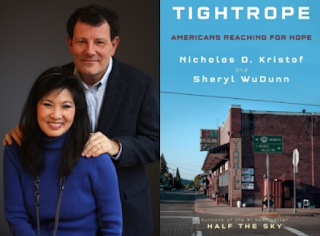 Back in 1962, sociologist and political activist Michael Harrington published a book entitled The Other America. In it, he argued that a full twenty-five percent of Americans were living in poverty. The book had a profound impact on both Jack and Bobby Kennedy and some said it was responsible for Lyndon Johnson’s War on Poverty.
Back in 1962, sociologist and political activist Michael Harrington published a book entitled The Other America. In it, he argued that a full twenty-five percent of Americans were living in poverty. The book had a profound impact on both Jack and Bobby Kennedy and some said it was responsible for Lyndon Johnson’s War on Poverty.
Forty-one years later in 2003, John Edwards spoke of “two Americas.” A nation divided by race, and by poverty.
And today, a full 58 years after Harrington’s look at poverty, the homeless crises is worse than ever, the streets of cities, large and small, are living evidence. The opiate and drug crises have hollowed out a large part of the country and the latest proposed federal budget reaches new heights in cutting social safety net programs.
It’s hard to think there is hope...for the country or for those left behind.
This is the world that Nicholas Kristoff and Sheryl WuDunn look at though a very personal lens in their book Tightrope: Americans Reaching for Hope.
My conversation with Nicholas Kristoff & Sheryl WuDunn:
Tuesday Feb 11, 2020
Tuesday Feb 11, 2020
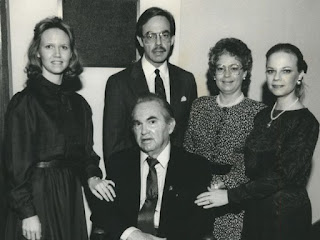 It’s hard to make the point in our 24/7 information-saturated culture, but all of us, politicians included, are a lot more than the worst or even the best thing that we have ever done.
It’s hard to make the point in our 24/7 information-saturated culture, but all of us, politicians included, are a lot more than the worst or even the best thing that we have ever done.
Couple that with the fact that times change so quickly, values change, norms change and what might have been acceptable in 1962 certainly would get you fired today. This is perhaps most true with respect to the subject of race, the singular stain of our founders that we have worked 240 + years to try and redress.
The story of race is a long complicated one and former Alabama Governor George Wallace was a part of it. Today, his daughter Peggy Wallace Kennedy tries to put her fathers life in perspective. People like the great John Lewis and Congresswoman Barbara Lee have lent their hands to help her in that effort. All while our current president tries to rekindle the hatred she has worked hard to try and extinguish.
Peggy Wallace Kennedy talks to me about her memoir The Broken Road: George Wallace and a Daughter’s Journey to Reconciliation and about her recollection of her father.
My conversation with Peggy Wallace Kennedy:
Wednesday Feb 05, 2020
If You Spend Hours Watching Cable News, You Are Just A Political Hobbyist
Wednesday Feb 05, 2020
Wednesday Feb 05, 2020
 Partly as a result of 24/7 cable news and its unending political coverage, politics today is simply another form of entertainment. A spectator sport at best.
Partly as a result of 24/7 cable news and its unending political coverage, politics today is simply another form of entertainment. A spectator sport at best.
We know the names of all the players. Nate silver homogenizes sports and election statistics as if we all had political bookies. We’re angry and we want purity tests for our candidates.
What we’ve lost sight of in all of this is what politics is actually for. It is, at its core, only about the wielding of power to accomplish something. Success comes not from shouting, or self-righteousness, or the sanctity of one’s views, but from the ability to muster the requisite number of votes.
This is true whether it’s about pre-existing conditions and guns or about filling a pothole or paving a road in your community.
Political science professor Eitan Hersh explains this in Politics Is for Power: How to Move Beyond Political Hobbyism, Take Action, and Make Real Change.
My conversation with Eitan Hersh:
Friday Jan 31, 2020
How Can We Avoid A New Generation of Brett Kavanaughs and Harvey Weinsteins
Friday Jan 31, 2020
Friday Jan 31, 2020
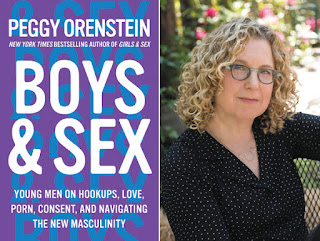 When an event truly captivates the nation, it’s usually because it touches on something that we’re not very good at talking about. Such was the case with the Brett Kavanaugh hearing.
When an event truly captivates the nation, it’s usually because it touches on something that we’re not very good at talking about. Such was the case with the Brett Kavanaugh hearing.
Reactions to Christine Blasey Ford personified a complex contradiction in our society. While many, particularly some men, respected her appearance and professionalism, they were way too quick to identify with and accept Brett Kavanaugh’s college sexual entitlement as some kind of norm. In doing that one wonders what message we are sending to boys and young men.
This disconnect between changing culture and stunted sexuality seems to lie at the heart of confusion that boys are experiencing today as they try to come to grips with intimacy and sexuality in a changing world while most are still stuck with sexuality in a 1955 time warp
It’s no wonder that people like Jordan Peterson tells his audience of angry young men to “look back to the 1950’s”
That's the world that best selling author and journalist Peggy Orenstein examines in Boys & Sex: Young Men on Hookups, Love, Porn, Consent, and Navigating the New Masculinity
My conversation with Peggy Orenstein:
Wednesday Jan 29, 2020
Australia's Climate Apocalypse: Up Close and Personal
Wednesday Jan 29, 2020
Wednesday Jan 29, 2020
 By now, we’ve all seen the pictures and footage of Australia-on-fire. In many ways it’s equivalent to those Rover pictures of Mars. They make us sit up and take notice, but we have no real feel for what it’s like and how life can survive, or even if it can. For that we can only appreciate firsthand accounts of what may very well be the first great climate apocalypse of the 21st century.
By now, we’ve all seen the pictures and footage of Australia-on-fire. In many ways it’s equivalent to those Rover pictures of Mars. They make us sit up and take notice, but we have no real feel for what it’s like and how life can survive, or even if it can. For that we can only appreciate firsthand accounts of what may very well be the first great climate apocalypse of the 21st century.
Some of you may have read Judith Crispin’s harrowing account of the fires in a recent story in WhoWhatWhy. Now amidst the fire and devastation, it is an honor to talk with Judith Crispin
Tuesday Jan 28, 2020
Silicon Valley and the Quest for Immortality
Tuesday Jan 28, 2020
Tuesday Jan 28, 2020
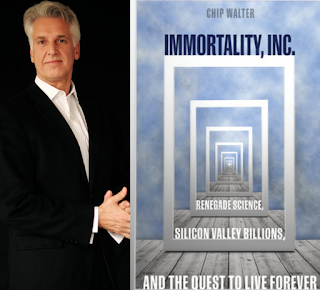 The not so subtle joke has always been that the two things that are inevitable are death and taxes. And while efforts are always front and center to conquer disease and extend our life span, the inevitability of death has always loomed large.
The not so subtle joke has always been that the two things that are inevitable are death and taxes. And while efforts are always front and center to conquer disease and extend our life span, the inevitability of death has always loomed large.
Even efforts to regenerate life and the fascination with cryogenics still acknowledged death.
Now a whole new group of scientists are trying to defy the evolutionary idea of death. The funny thing is it’s not happening in the great halls of medicine. Not at NIH or Cleveland or Mayo Clinic or at our other great research hospitals, but in Silicon Valley. There, a group of wealthy boomers, not unlike aging politicians I guess, will do anything to avoid stepping aside. This is the world that Chip Walter takes us into in Immortality, Inc.: Renegade Science, Silicon Valley Billions, and the Quest to Live Forever
My conversation with Chip Walter:
Wednesday Jan 22, 2020
Saving America From Trump, and Democrats From Themselves
Wednesday Jan 22, 2020
Wednesday Jan 22, 2020
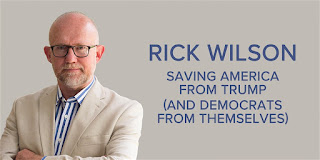 Last Sunday the venerable NY Times got it all wrong. They said, and I’m quoting, “On the Democratic side, an essential debate is underway between two visions that may define the future of the party and perhaps the nation.” Not so.
Last Sunday the venerable NY Times got it all wrong. They said, and I’m quoting, “On the Democratic side, an essential debate is underway between two visions that may define the future of the party and perhaps the nation.” Not so.
The only thing that will really define the future of either party and of the nation is the defeat of Donald Trump. And anything that stops short of focusing on that and that alone is a failure of imagination.
The times went on to say, and again I’m quoting, “with a crowded field and with traditional polling in tatters, that calculation calls for a hefty dose of humility about anyone’s ability to foretell what voters want.” Wrong again.
Focus groups, polling, and campaigns still matter. They matter not just in “the election,” but in the elections in the states that will actually shape the outcome of that election.
It’s not a mystery. The methods today may be more modern, but campaigns for candidates, not unlike advertising for a product, if a done right, will work!
And that, not some vague nuances of policy is the only thing that will defeat Trump.
To try and explain and reinforce these ideas I’m joined by. Rick Wilson the author of the #1 New York Times bestseller Everything Trump Touches Dies and most recently Running Against the Devil: A Plot to Save America from Trump--and Democrats from Themselves
My conversation with Rick Wilson:
Monday Jan 20, 2020
It's Ok To Compromise and Maybe Even to Sellout Sometimes
Monday Jan 20, 2020
Monday Jan 20, 2020
 In our current political and social climate, when polarization is so extreme, when purity tests are often required by your tribe, the idea of compromise and what some call “selling out,” takes on added weight and significance.
In our current political and social climate, when polarization is so extreme, when purity tests are often required by your tribe, the idea of compromise and what some call “selling out,” takes on added weight and significance.
But because positions and even sometimes values are often so extreme does compromise and selling out even mean what it used to? And if not, can we actually square the circle of compromise, selling out and ethics.
That's the question that Inge Hansen asks in The Ethical Sellout: Maintaining Your Integrity in the Age of Compromise.
My conversation with Inge Hansen:
Tuesday Jan 14, 2020
Human Nature Always Finds A Way
Tuesday Jan 14, 2020
Tuesday Jan 14, 2020
 Most of you know the story of the scorpion and the frog and what it tells us about human nature.
Most of you know the story of the scorpion and the frog and what it tells us about human nature.
It’s no surprise than that our everyday encounters, at work, at home, and on the street are driven by our innate nature. Wouldn’t it be easier if there were a set of immutable laws by which to understand that nature? Law that really might have been helped that frog?
These are the rules laid down by bestselling author Robert Greene. Greene, the author of The 48 Laws of Power and the Art of Seduction, now lays out The Laws of Human Nature
My conversation with Robert Greene:
Wednesday Jan 08, 2020
Can the Generational Divide Lead Us Out Of Division?
Wednesday Jan 08, 2020
Wednesday Jan 08, 2020
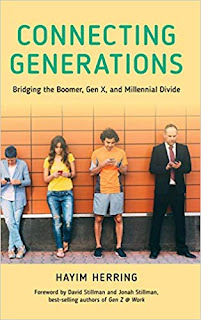 We see endlessly how we are siloed with respect to politics, race, and geography. Add to this the generational silos that we all seem to live in.
We see endlessly how we are siloed with respect to politics, race, and geography. Add to this the generational silos that we all seem to live in.
Reams have been written about intergenerational conflict, particularly in the workplace. But might this be the one area where the imaginary lines of divisions can be crossed? Can the improvement of intergenerational relationships in the workplace be a kind of Rosetta Stone for better understanding of all the other issues that divide us? Issues that are fed by speed, modernity, technology, and popular culture. This is the exploration that Hayim Herrirng gives us in Connecting Generations: Bridging the Boomer, Gen X, and Millennial Divide.
My conversation with Hayim Herring:
Sunday Jan 05, 2020
Do You Need Further Reminders that This Is Not Your Father's Workplace
Sunday Jan 05, 2020
Sunday Jan 05, 2020
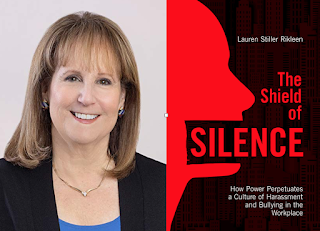 The Harvey Weinstein trial, which begins this week, while perhaps extreme in its nature, reminds us of the realities of today’s work place.
The Harvey Weinstein trial, which begins this week, while perhaps extreme in its nature, reminds us of the realities of today’s work place.
Today it’s not enough to just stay on top of one's career and professional knowledge and development. There is also the changing dynamics and culture of the workplace itself. Multi-generational, multi-gender, multi-age, and the seemingly increased sensitivity and scrutiny.
The irony is that it is this very diversity, that carries within it the seeds and the power, to help us understand and to strive to function frictionlessly within it. In fact, it is only by embracing this very diversity that businesses can succeed in today’s environment.
Lauren Stiller Rikleen is the founder and president of the Rikleen Institute for Strategic Leadership, and is a provider of training, speaking, and consulting services to professional services entities. In her new book The Shield of Silence: How Power Perpetuates a Culture of Harassment and Bullying in the Workplace she addresses the strengthening multi-generational teams, women’s leadership and advancement, and minimizing the impact of unconscious bias.
My conversation with Lauren Stiller Rikleen:
Monday Dec 30, 2019
Why Most Health Care is Barking Up the Wrong Tree
Monday Dec 30, 2019
Monday Dec 30, 2019
 Some of you may have seen the story that owning a dog gave you a 27% chance of living longer. Some of that was related to the exercise of walking the dog, some to the companionship, and the basic human-dog bond.
Some of you may have seen the story that owning a dog gave you a 27% chance of living longer. Some of that was related to the exercise of walking the dog, some to the companionship, and the basic human-dog bond.
But suppose the reality was much deeper than that. Suppose dogs could be diagnosticians and even healers and protect us from the onset of symptoms. They can and many already do.
This is the world that Maria Goodavage, veteran journalist and New York Times bestselling author of Soldier Dogs, takes us into in her latest Doctor Dogs: How Our Best Friends Are Becoming Our Best Medicine
My conversation with Maria Goodavage
Friday Dec 27, 2019
William Greider R.I.P.
Friday Dec 27, 2019
Friday Dec 27, 2019
 William Greider always knew that the chickens would come home to roost. Over many conversations, since 1997, he seemed to know and report the truth of that old adage "that if things were going to stay the same, a lot of things had to change." My conversation with Greider in March of 2010. RIP William Greider
William Greider always knew that the chickens would come home to roost. Over many conversations, since 1997, he seemed to know and report the truth of that old adage "that if things were going to stay the same, a lot of things had to change." My conversation with Greider in March of 2010. RIP William Greider
Tuesday Dec 24, 2019
Something to Think About As You Eat that Holiday Steak........
Tuesday Dec 24, 2019
Tuesday Dec 24, 2019
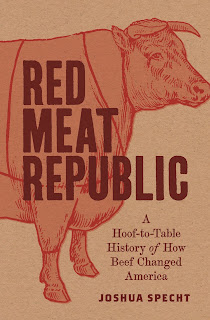 It’s long been an adage that what we eat, defines who we are. That’s never been truer than in our polarized world today and beef and its mass production has long been at the center of this definition.
It’s long been an adage that what we eat, defines who we are. That’s never been truer than in our polarized world today and beef and its mass production has long been at the center of this definition.
From the mid 19th century, the history of beef parallels, and often reflects social, cultural and economic changes. From the great plains in the 1850s to the slaughterhouses of the midwest, to the first McDonalds in San Bernardino in 1940, “where’s the beef,” has often told us who we are.
Joshua Specht tells us more in Red Meat Republic: A Hoof-to-Table History of How Beef Changed America
My conversation with Joshua Specht:
Thursday Dec 19, 2019
Can America's Military Ever Recover?
Thursday Dec 19, 2019
Thursday Dec 19, 2019
 We all know that whether it’s a child’s toy or a powerful institution if something is built solid, misuse or the infliction of damage will not usually break it. How many times have you dropped your phone and it’s been fine? On the other hand, that which is weak or frayed will unravel with the least amount of stress.
We all know that whether it’s a child’s toy or a powerful institution if something is built solid, misuse or the infliction of damage will not usually break it. How many times have you dropped your phone and it’s been fine? On the other hand, that which is weak or frayed will unravel with the least amount of stress.
In many ways, we can say that about America’s foreign policy and military establishment. Weakened over the years by uncertainly, hesitation partisanship, bad decisions and an exaggerated admiration that acted like a kind of superglue, that held the whole thing together.
However, in the hands of a rambunctious child, one with no respect for his property or what he was given, it can not hold.
This is the world of Donald Trump and today’s American military and foreign policy. Fragile from the start, this spoiled, bratty impetuous child may have finally broken it.
That’s the story that my guest Peter Bergen tells in Trump and His Generals: The Cost of Chaos.
My conversation with Peter Bergen:
Wednesday Dec 18, 2019
From Useful Idiot to Working Asset
Wednesday Dec 18, 2019
Wednesday Dec 18, 2019
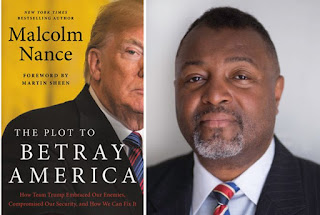 Perhaps our greatest spy novelist of the cold war, John le Carré, talks about what he sees as the appetite for superpower, that still exists in the U.S. and Russia. He says that what’s shared is the desire for oligarchy, the dismissal of truth, the contempt actually for the electorate, and for the democratic system. That’s common to both of them.
Perhaps our greatest spy novelist of the cold war, John le Carré, talks about what he sees as the appetite for superpower, that still exists in the U.S. and Russia. He says that what’s shared is the desire for oligarchy, the dismissal of truth, the contempt actually for the electorate, and for the democratic system. That’s common to both of them.
While the U.S. has certainly made mistakes, and was not always been pure in its motives and actions, today under Donald Trump something is different. What is it, and how did we get here, and to what extent is the Trump-Russia connection part of what’s changed? Is Putin as Machiavellian as we’ve been led to believe, and have we now gone too far down the rabbit hole for any of this to change?
Few understand this better than Malcolm Nance, who back in 2014 was prescient about some of the issues that we’re facing and litigating, on this very day.
Malcolm Nance is a former U.S. Navy officer specializing in cryptology. He’s an internationally recognized intelligence, a foreign policy commentator, and a counter terrorism analyst for NBC news and MSNBC and his newest work is
My WhoWhatWhy conversation with Malcom Nance:
Tuesday Dec 17, 2019
The Model For Taking It To The Streets
Tuesday Dec 17, 2019
Tuesday Dec 17, 2019
 Just as we saw in America in the 1960s, as we saw when the Berlin Wall fell, as we witnessed in the Middle East, during the Arab Spring, and as we are witnessing today in Hong Kong, young people are always at the ramparts of change and revolution. This was equally true in France in the run-up to WWII and in the resistance to the German occupation.
Just as we saw in America in the 1960s, as we saw when the Berlin Wall fell, as we witnessed in the Middle East, during the Arab Spring, and as we are witnessing today in Hong Kong, young people are always at the ramparts of change and revolution. This was equally true in France in the run-up to WWII and in the resistance to the German occupation.
On a day when people, mostly young, are taking to the streets, it’s worth talking to Ronald Rosbottom, about Sudden Courage: Youth in France Confront the Germans, 1940-1945
My conversation with Ronald Rosbottom:
Thursday Dec 12, 2019
Thursday Dec 12, 2019
 The great screenwriter William Goldman once said of Hollywood that nobody knows anything. The physicist Richard Feynman once said that no one understands quantum mechanics.
The great screenwriter William Goldman once said of Hollywood that nobody knows anything. The physicist Richard Feynman once said that no one understands quantum mechanics.
And yet random as knowledge sometimes might be, it safe to say that the entire technological infrastructure of modern society, all of Silicon Valley, is built on top of the reliable functioning quantum mechanics.
Quantum Mechanics has been around since 1927. It is so ubiquitous in some ways that it’s been a little like being able to tell time and use that value of the information while not having any understanding of how a watch (digital or otherwise) actually works.
That where Sean Carroll comes and his book Something Deeply Hidden: Quantum Worlds and the Emergence of Spacetime.
My conversation with Sean Carroll
Monday Dec 09, 2019
What Happens to Ancestry Testing DNA?
Monday Dec 09, 2019
Monday Dec 09, 2019
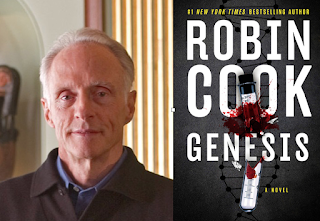 It’s no surprise that many fear technology is out of control. AI, facial recognition and robotics are the stuff of science fear. But it’s biotechnology and the understanding of what makes us tick that may be the ultimate frontier to both human understanding and human abuse by those that are malevolent.
It’s no surprise that many fear technology is out of control. AI, facial recognition and robotics are the stuff of science fear. But it’s biotechnology and the understanding of what makes us tick that may be the ultimate frontier to both human understanding and human abuse by those that are malevolent.
Few understand this better than bestselling novelist Dr. Robin Cook. He has used his insights into the future to scare the bejesus out of us in his books like Coma, Cure, and Fever. Now in his latest work, Genesis he walks us through the cost-benefit analysis of DNA and even your simple search for ancestry.
My conversation with Dr. Robin Cook:
Sunday Dec 01, 2019
The Best and the Brightest of America's Diplomats
Sunday Dec 01, 2019
Sunday Dec 01, 2019
 Clausewitz said that politics or diplomacy was “war by other means.”
Clausewitz said that politics or diplomacy was “war by other means.”
Churchill put it more colorfully when he said that “diplomacy is the art of telling people to go to hell in such a way that they ask for directions.”
The Impeachment hearings have pulled back the cover on the work, the integrity, and the quality of America’s diplomats. Perhaps it’s their self effacing, sometimes quiet professionalism that makes them targets for the more malevolent unprofessional forces in government. This was as true with respect to the attacks on the State Department During the dark days of Joe McCarthy, or equally dark days of Donald Trump.
Whatever the reason, perhaps there is no better time to look at these talented and smart men and women than in the middle of the current Ukraine scandal. That's what Paul Richter does inThe Ambassadors: America's Diplomats on the Front Lines
My conversation with Paul Richter:
Monday Nov 25, 2019
Kickstarting a Better World
Monday Nov 25, 2019
Monday Nov 25, 2019
 The great playwright Arthur Miller once wrote that too often “we know the price of everything and the value of nothing.” Perhaps nowhere is that truer than today. In a world where profit maximization and transactional value often seems to dominate, and the current push back to that could have unintended consequences, how do we find our equilibrium? How do we create a world of money and value, a world of profit and purpose, unbridled ambition and deeper meaning?
The great playwright Arthur Miller once wrote that too often “we know the price of everything and the value of nothing.” Perhaps nowhere is that truer than today. In a world where profit maximization and transactional value often seems to dominate, and the current push back to that could have unintended consequences, how do we find our equilibrium? How do we create a world of money and value, a world of profit and purpose, unbridled ambition and deeper meaning?
Yancey Strickler, a co-founder and former CEO of Kickstarter, now looks beyond the narrow focus of Silicon Valley into a way that just might bring on an exciting and better world. He shares his views in This Could Be Our Future: A Manifesto for a More Generous World
My conversation with Yancey Strickler:
Monday Nov 18, 2019
Fake is Sometimes Real
Monday Nov 18, 2019
Monday Nov 18, 2019
 Artificial flavors, fake news, authentic copies, and real replicas. They all sound like oxymoronic gibberish at worst, overzealous marketing at best.
Artificial flavors, fake news, authentic copies, and real replicas. They all sound like oxymoronic gibberish at worst, overzealous marketing at best.
And so it is that sometimes the fake is indeed real. Today we can appreciate and even learn or feel something by looking at a replica piece of art or liking an artificial version of our favorite food flavor or enjoying fake meat, But how about owning a Chinese made Louie Vuitton bag, Rolex or Mont Blanc pen?
The danger of course, on every level, is that we may have so blurred the lines between fake and real that virtual reality is no longer something we need glasses to see, it just the world we live in every day. That's the world that Lydia Pyne teaches us about in Genuine Fakes
My conversation with Lydia Pyne:
Monday Nov 11, 2019
Only Whistleblowers Can Save Democracy
Monday Nov 11, 2019
Monday Nov 11, 2019
 Edward Snowden, Chelsea Manning, Coleen Rowley, and the whistleblower who let us know about the Ukraine call, are just a few whose actions sparked international dialogue and their names may be universally recognized. But brave though they were, their courage isn’t universally revered.
Edward Snowden, Chelsea Manning, Coleen Rowley, and the whistleblower who let us know about the Ukraine call, are just a few whose actions sparked international dialogue and their names may be universally recognized. But brave though they were, their courage isn’t universally revered.
Back in 2002 TIME magazine named three whistleblowers as people of the year and famed whistleblowers such as Frank Serpico, Jeffrey Wigand, and Karen Silkwood have been the subject of major films. Yet vitriol continues against individuals willing to speak out when they see crimes being committed.
Why are those who dare to expose corruption and worse so frequently ostracized? Why are we so quick to call treason on those who speak truth in the face of power? And what historical and patriotic obligation do we have to support and protect those that speak up? That’s our focus today as I’m joined by Middlebury College professor Allison Stanger to talk about Whistleblowers: Honesty in America from Washington to Trump
My WhoWhatWhy conversation with Allison Stanger:
Monday Nov 11, 2019
Why is Science Under Assault?
Monday Nov 11, 2019
Monday Nov 11, 2019
 Even when we don’t realize it, science is part of our lives. Physics, chemistry, biology...it’s all essential to our survival. So why is the general subject so confusing these days? Why do laymen think they know better than scientists?
Even when we don’t realize it, science is part of our lives. Physics, chemistry, biology...it’s all essential to our survival. So why is the general subject so confusing these days? Why do laymen think they know better than scientists?
And perhaps more importantly, at a time when everything else is advancing, when the cutting edge of
science impacts us all, how have the methodologies of science kept pace with modernity? Perhaps we’re all too stuck in the mindset of high school science class, and maybe that’s why we can’t progress in our thinking.
James Zimring, Professor of pathology at the University of Virginia, where he pursues basic and translational research in the field of transfusion medicine and blood biology, gives us some insight in What Science Is and How It Really Works
My conversation with James Zimring:
Monday Nov 04, 2019
The Battle of Mosul - The Last Great Battle Against Isis
Monday Nov 04, 2019
Monday Nov 04, 2019
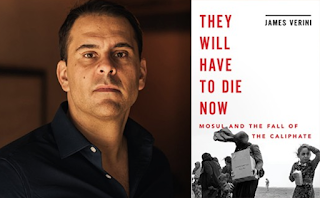 While many of you can recite the great battles of WW I and II and even the Civil War, the more recent battle that have been fought in the Middle East against ISIS are already forgotten. Certainly, the battle for Mosul was one of those
While many of you can recite the great battles of WW I and II and even the Civil War, the more recent battle that have been fought in the Middle East against ISIS are already forgotten. Certainly, the battle for Mosul was one of those
Beyond that, there is the relevance to events taking place today. The battle for Mosul, which helped take down ISIS in 2017, had as a major component, the forces of the autonomous region of Kurdistan. 40,000 Kurds that were part of the joint military effort in a battle every bit as important and as bloody as those of WW II.
Journalist James Verini was embedded with the Iraqi counter-terrorism service during the battle and tells the remarkable story in They Will Have to Die Now: Mosul and the Fall of the Caliphate
My conversation with James Verini:
Tuesday Oct 29, 2019
He is a Being Made of Television
Tuesday Oct 29, 2019
Tuesday Oct 29, 2019
 There is not a morning that goes by without some story about the impact of social media. The power of Facebook or Twitter, or Instagram. With all of that, it’s easy to forget the power of television. Its impact on our lives growing up, its power today and what it has wrought. It’s given us Ronald Regan, Josiah Bartlet, and Donald Trump.
There is not a morning that goes by without some story about the impact of social media. The power of Facebook or Twitter, or Instagram. With all of that, it’s easy to forget the power of television. Its impact on our lives growing up, its power today and what it has wrought. It’s given us Ronald Regan, Josiah Bartlet, and Donald Trump.
Howard Beal laid it out for us in Network, but James Poniewozik gives us the contemporary context in his new book Audience of One: Donald Trump, Television, and the Fracturing of America
My conversation with James Peniewozik:
Saturday Oct 26, 2019
The Science of Kindness Is Real
Saturday Oct 26, 2019
Saturday Oct 26, 2019
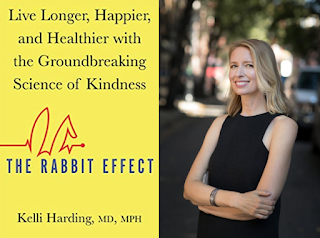 In many communities you often see people wearing a button that says Be Kind. In an ever competitive
In many communities you often see people wearing a button that says Be Kind. In an ever competitive
and sometimes selfish world that’s not always easy to do. Our political dialogue makes it even more difficult. Add to that our economic and personal pressures and the acceleration that we all face, and kindness often gets left way behind.
But suppose we found out that kindness is not just something we can do to make us feel better, suppose we discovered that kindness can really help us live longer and healthier lives. Not in some mystical and karmic way, but in a very real, practical and scientifically based context.
Discovering this has been the work of Dr. Kelli Harding. She explains in her book The Rabbit Effect: Live Longer, Happier, and Healthier with the Groundbreaking Science of Kindness.
My conversation with Dr. Kelli Harding
Thursday Oct 24, 2019
Thursday Oct 24, 2019
 Imagine if you went to buy a car and rather than one price for the car, you had to essentially buy it ala carte. You had to negotiate a separate price for the wheels, for the engine, for the paint, for seats, all separate. All from different suppliers and all with hidden fees. Sound ridiculous? But that is essentially how we pay for health care in America.
Imagine if you went to buy a car and rather than one price for the car, you had to essentially buy it ala carte. You had to negotiate a separate price for the wheels, for the engine, for the paint, for seats, all separate. All from different suppliers and all with hidden fees. Sound ridiculous? But that is essentially how we pay for health care in America.
It’s no wonder that there is no more polarizing issues than the delivery and the cost of health care. It’s why it’s front and center in our politics, and in all of our lives. It’s a system that alone makes us sick.
It’s amazing how many people say they like their doctors, but hate the system. A system that is broken, has lost public trust and has become a business model in which price gouging is built-in, outcomes are not part of pricing, and it corrupts people who often start out as idealists.
This is the system that Dr. Marty Makary details in The Price We Pay: What Broke American Health Care--and How to Fix It.
My conversation with Dr. Marty Makary:
Monday Oct 21, 2019
Monday Oct 21, 2019
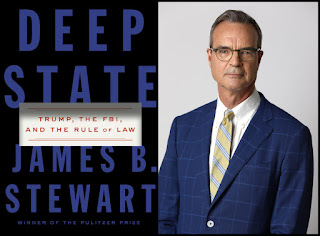 The world is a complex place. The news comes at us at hyper-speed and 24/7. All while we have to deal with family, work and life.
The world is a complex place. The news comes at us at hyper-speed and 24/7. All while we have to deal with family, work and life.
Therefore more than ever, it’s critical that there are those among us, journalists mostly, whose job it is to distill and explain events to us. Not to tell us how or what to think, but to present the big stories in-depth and in a narrative that allows us to be smarter about the world, and refine how we are to live in it.
Few do this better than James B. Stewart. He has been doing it for years with books such as Blood Sport, Den of Thieves, and Disney Wars. Now with his latest Deep State: Trump, the FBI, and the Rule of Law, he takes us deep inside what we’ve all lived through for the past three years. The investigation of Hillary Clinton’s emails and of Trump, Russia, Comey and the Mueller Report. All of which has lead us to where we are today.
My conversation with James B. Stewart:
Thursday Oct 17, 2019
Harold Bloom 1930 - 2019
Thursday Oct 17, 2019
Thursday Oct 17, 2019
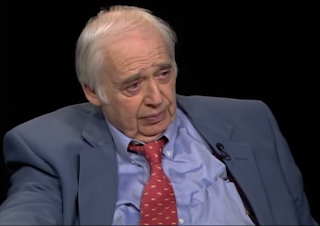 Harold Bloom, who died last week at the age of 89, was one of our great teachers and literary critics. Often out of sync with contemporary literary fashion, he defended the “Western canon” and fought against what he called “the School of Resentment,” multiculturalists and those whom he argued betrayed what he saw as literature’s essential purpose.
Harold Bloom, who died last week at the age of 89, was one of our great teachers and literary critics. Often out of sync with contemporary literary fashion, he defended the “Western canon” and fought against what he called “the School of Resentment,” multiculturalists and those whom he argued betrayed what he saw as literature’s essential purpose.
I had the opportunity to know Professor Bloom as a student, and later in life, I had the opportunity to interview him. Most recently in 2000 upon the publication of his book How to Read and Why
Here is that conversation with Professor Harold Bloom
Tuesday Oct 15, 2019
Tuesday Oct 15, 2019
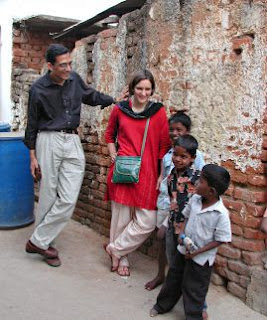 Beyond the common denominator of poverty what are aspects of the poor that we just don't understand?
Beyond the common denominator of poverty what are aspects of the poor that we just don't understand?
We've learned that poverty itself creates a different life, a different view of the world. A view that arguably accounts for the fundamental failures of so many well-meaning programs. Why this is, what works and why has it been so hard to find the magic bullet. Trying to answer this has been the work of the winners of this year's Nobel Prize in economics, Esther Duflo and Abhijit Banerjee.
My conversation with Esther Duflo and Abhijit Banerjee:

